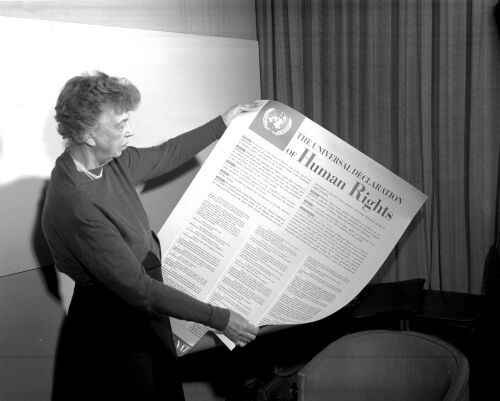What are Human Rights?
Human rights are the rights all human beings possess because of their humanity. They protect the dignity of all persons and are due to all human beings equally, without distinction, regardless of “(…) race, colour, sex, language, religion, political or other opinion, national or social origin, birth or other status.“ (Art 2 of the Universal Declaration of Human Rights adopted by the United Nations on 10/12/1948). This anti-discriminatory core of human rights shows that by their very nature they do not allow any discrimination.
Human rights are innate i.e. every human being is born with them, and they can neither be given to you nor taken away from you. They are universal, i.e. they are valid world-wide. In spite of different traditions and cultural diversity, they form a core of rights which apply to all human beings.
A further characteristic of human rights is that they are indivisible. Human rights mutually depend on each other, and there is no hierarchy of rights. Civil, political, economic, social, and cultural rights must all be implemented in their entirety. Violation of one human right has repercussions for other human rights. Realising the right for life, for example, is closely linked to the right to nutrition.
Development of Human Rights After 1945
The crimes of the National Socialist regime of terror demonstrated to the international community of states that it was necessary to take measures to protect human rights. At the end of World War II, the United Nations were founded whose charter proclaims as one of its main goals “promoting and encouraging respect for human rights and for fundamental freedoms for all without distinction as to race, sex, language, or religion“. In order to achieve this goal, the United Nations Organisation (UNO), on 10 December, 1948, adopted the Universal Declaration of Human Rights (UDHR) with no dissenting vote.
Eleanor Roosevelt with the Spanish version of the Universal Declaration of Human Rights
As a declaration it is not binding in international law, but is regarded as part of international customary law. The rights contained in it were the basis for two binding international human rights covenants: the International Covenant on Civil and Political Rights and the International Covenant on Economic and Cultural Rights. These covenants were adopted in 1966 and, after they had been ratified by a sufficient number of signatory states, became effective in 1977.
Over the years, further important human rights covenants have been adopted, both within the UNO framework and at a regional level. In this way, an impressive network of human rights norms and a comprehensive protection system have been established which are intended to monitor adherence to the obligations of international law in this field. However, in spite of all these covenants and control mechanisms, human rights are violated daily all over the world, and thus human dignity is infringed. It is therefore an important task for every human being to demand respect for human rights all the time, and with great emphasis, for themselves and for others.
References:
K. Peter Fritzsche: Menschenrechte, Eine Einführung mit Dokumenten, Paderborn 2004
Michael Krennerich, „Was Sie schon immer über Menschenrechte wissen wollten! Kurze Antworten zu häufig gestellten Fragen“, on

